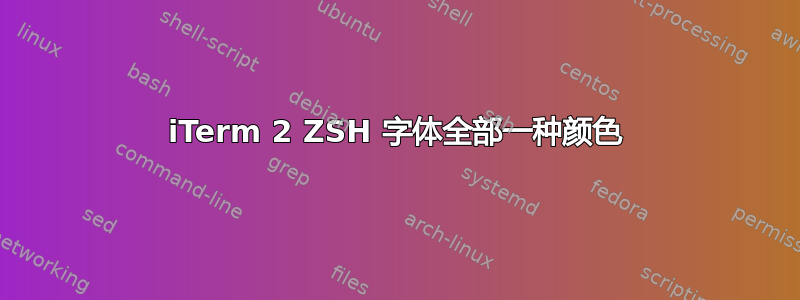
机器:macOS Ventura 13.3
我的 iTerm2 不会使用除全白(在 vim 中为全黑)以外的任何其他颜色作为字体。有人能看出我做错了什么吗?
下面链接的图像显示了
print -P '%F{yellow}yellow %F{2}green %1Fred %F{117}light blue'
和我的 iTerm2 配置文件颜色设置:
另外,这是我的 iTerm2 配置文件终端设置的照片:
这是我的.zshrc:
# If you come from bash you might have to change your $PATH.
# export PATH=$HOME/bin:/usr/local/bin:$PATH
# Path to your oh-my-zsh installation.
export ZSH="$HOME/.oh-my-zsh"
# Set name of the theme to load --- if set to "random", it will
# load a random theme each time oh-my-zsh is loaded, in which case,
# to know which specific one was loaded, run: echo $RANDOM_THEME
# See https://github.com/ohmyzsh/ohmyzsh/wiki/Themes
ZSH_THEME="afowlermod"
# Set list of themes to pick from when loading at random
# Setting this variable when ZSH_THEME=random will cause zsh to load
# a theme from this variable instead of looking in $ZSH/themes/
# If set to an empty array, this variable will have no effect.
# ZSH_THEME_RANDOM_CANDIDATES=( "robbyrussell" "agnoster" )
# Uncomment the following line to use case-sensitive completion.
# CASE_SENSITIVE="true"
# Uncomment the following line to use hyphen-insensitive completion.
# Case-sensitive completion must be off. _ and - will be interchangeable.
# HYPHEN_INSENSITIVE="true"
# Uncomment one of the following lines to change the auto-update behavior
# zstyle ':omz:update' mode disabled # disable automatic updates
# zstyle ':omz:update' mode auto # update automatically without asking
# zstyle ':omz:update' mode reminder # just remind me to update when it's time
# Uncomment the following line to change how often to auto-update (in days).
# zstyle ':omz:update' frequency 13
# Uncomment the following line if pasting URLs and other text is messed up.
# DISABLE_MAGIC_FUNCTIONS="true"
# Uncomment the following line to disable colors in ls.
# DISABLE_LS_COLORS="true"
# Uncomment the following line to disable auto-setting terminal title.
# DISABLE_AUTO_TITLE="true"
# Uncomment the following line to enable command auto-correction.
# ENABLE_CORRECTION="true"
# Uncomment the following line to display red dots whilst waiting for completion.
# You can also set it to another string to have that shown instead of the default red dots.
# e.g. COMPLETION_WAITING_DOTS="%F{yellow}waiting...%f"
# Caution: this setting can cause issues with multiline prompts in zsh < 5.7.1 (see #5765)
# COMPLETION_WAITING_DOTS="true"
# Uncomment the following line if you want to disable marking untracked files
# under VCS as dirty. This makes repository status check for large repositories
# much, much faster.
# DISABLE_UNTRACKED_FILES_DIRTY="true"
# Uncomment the following line if you want to change the command execution time
# stamp shown in the history command output.
# You can set one of the optional three formats:
# "mm/dd/yyyy"|"dd.mm.yyyy"|"yyyy-mm-dd"
# or set a custom format using the strftime function format specifications,
# see 'man strftime' for details.
# HIST_STAMPS="mm/dd/yyyy"
# Would you like to use another custom folder than $ZSH/custom?
# ZSH_CUSTOM=/path/to/new-custom-folder
# Which plugins would you like to load?
# Standard plugins can be found in $ZSH/plugins/
# Custom plugins may be added to $ZSH_CUSTOM/plugins/
# Example format: plugins=(rails git textmate ruby lighthouse)
# Add wisely, as too many plugins slow down shell startup.
plugins=(git)
source $ZSH/oh-my-zsh.sh
# User configuration
# export MANPATH="/usr/local/man:$MANPATH"
# You may need to manually set your language environment
# export LANG=en_US.UTF-8
# Preferred editor for local and remote sessions
# if [[ -n $SSH_CONNECTION ]]; then
# export EDITOR='vim'
# else
# export EDITOR='mvim'
# fi
# Compilation flags
# export ARCHFLAGS="-arch x86_64"
# Set personal aliases, overriding those provided by oh-my-zsh libs,
# plugins, and themes. Aliases can be placed here, though oh-my-zsh
# users are encouraged to define aliases within the ZSH_CUSTOM folder.
# For a full list of active aliases, run `alias`.
#
# Example aliases
# alias zshconfig="mate ~/.zshrc"
# alias ohmyzsh="mate ~/.oh-my-zsh"
和我的 zsh 主题:
PROMPT='jess %B%F{blue}:: %b%F{green}%3~ $(hg_prompt_info)$(git_prompt_info)%B%(!.%F{red}.%F{blue})»%f%b '
RPS1='%(?..%F{red}%? ↵%f)'
ZSH_THEME_GIT_PROMPT_PREFIX="%{$fg[yellow]%}‹"
ZSH_THEME_GIT_PROMPT_SUFFIX="› %{$reset_color%}"
ZSH_THEME_HG_PROMPT_PREFIX="%{$fg[magenta]%}hg:‹%{$fg[yellow]%}"
ZSH_THEME_HG_PROMPT_SUFFIX="%{$fg[magenta]%}› %{$reset_color%}"
ZSH_THEME_HG_PROMPT_DIRTY=" %{$fg[red]%}✗"
ZSH_THEME_HG_PROMPT_CLEAN=""
我也使用病原体来设置我的 vim 主题,我的.vimrc外观如下:
set ruler
execute pathogen#infect()
set cursorline
syntax on
filetype plugin indent on
syntax enable
set background=light
colorscheme solarized
我的.vim目录:
jess :: ~/.vim » tree
.
├── autoload
│ └── pathogen.vim
└── bundle
├── README.mkd
├── autoload
│ └── togglebg.vim
├── bitmaps
│ └── togglebg.png
├── colors
│ └── solarized.vim
├── doc
│ ├── solarized.txt
│ └── tags
└── vim-colors-solarized
├── README.mkd
├── autoload
│ └── togglebg.vim
├── bitmaps
│ └── togglebg.png
├── colors
│ └── solarized.vim
└── doc
├── solarized.txt
└── tags





